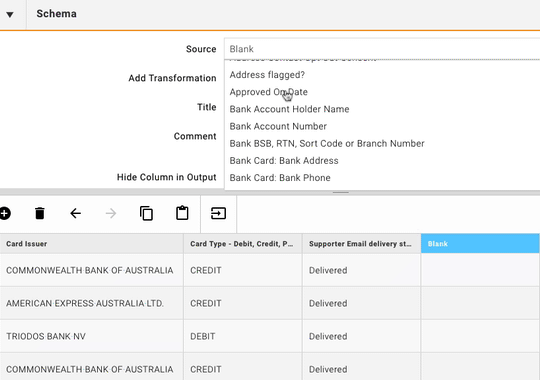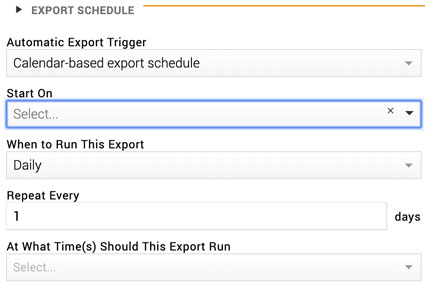Exporting Data¶
There are many occasions where you need to export the data that has been collected in Evergiving for use in other systems or for backing-up.
The exported data can be text based (xml, csv etc) or pushed directly into another system, either manually or scheduled.
Export data Types¶
The four types of export data types and why you would export them:
| Export Type | Description | Reason for Export |
|---|---|---|
pledge |
Pledge data, including donor information and donation details. | To analyze and report on fundraising performance, donor contributions, and pledge fulfillment. |
timesheet |
Timesheet data, including hours worked by fundraisers and agents. | To manage payroll, track working hours, and ensure compliance with labor regulations. |
fundraiser |
Fundraiser data, including individual performance and campaign contributions. | To evaluate fundraiser effectiveness, track campaign progress, and optimize resource allocation. |
agent |
Agent data, including assignments and performance metrics. | To monitor agent activities, assess productivity, and improve operational efficiency. |
Export Output Types¶
This data can be exported in these ways:
| Output Type | Description | Output Destination options |
|---|---|---|
| Comma-Separated Values (CSV) | Simple tabular data format readable by most applications | Email (S3), SFTP |
| EBIC Datastore | Internal data storage format for EBIC | Internal ([EBIC) |
| Excel Spreadsheet (XLS) | Microsoft Excel file format with support for formatting | Email (S3), SFTP |
| Extensible Markup Language (XML) | Structured, hierarchical data format with custom tags | Email (S3), SFTP |
| JSON API | Lightweight data interchange format using REST API | Multiple Destinations (JSON) |
| Microsoft Dynamics Replication | Direct integration with Microsoft Dynamics | Direct (Microsoft Dynamics Connection) |
| Salesforce Replication | Direct integration with Salesforce platform | Direct (Salesforce Connection) |
| UNICEF SES | Specialized format for UNICEF's Strategic Enrollment System | Direct (UNICEF SES) |
| Webhooks | Event-driven HTTP callbacks for real-time notifications | Multiple Destinations (Webhooks) |
For security reasons the data can not be directly downloaded from the Evergiving site onto your computer.
Creating Exports with Export Builders¶
To create an export you create a reusable Export Builder. The Export Section lists the Export Builders and lets you add export builders.
Due to the various possible end targets, an Export builder is highly customisable and very accurate. This accuracy is critical because:
- The workflows involved are quite sophisticated.
- The target systems are often fragile.
- There is almost zero tolerance for errors.
This feature handles not just personal and contact information but also the metadata associated with fundraising activities. It ensures that all downstream processes like charity work, reporting, and invoicing are correctly managed.
Note
Typically, data leaves Evergiving in one of two ways: either through this feature set or through a Payment Gateway during phone calls or face-to-face interactions. The latter is a separate operation, usually containing credit card details, and is not part of this feature set.
Export Destinations¶
There are multiple different export destinations, some go directly to another website, or can be sent to a server for later download through an emailed link, such as through your own SFTP server or an S3 bucket (Amazon server) with a signed URL. We also support encryption, especially when handling credit card data.
For CSV exports, you can customize file names, date formats, and output formats. Filters and schedules determine which records are included in the export.
You can also add attachments, like Signatures, Photographs, PDFs and Call Recordings.

SFTP Export Connection¶
You would use this option to store the data on your own secure server. This can be configured in Accounts > SFTP Connections .
S3 Export Destination¶
If you do not have your own secure server, Evergiving can send the file to a secure Amazon S3 server, and send an email to that file by email. The files will be stored temporarily:
- Encrypted (GPG) - 24 hours
- Unencrypted - 1 week
Salesforce Connection¶
This can be configured in Accounts > Salesforce
Microsoft Dynamics Connection¶
This can be configured in Accounts > Microsoft Dynamics
Formatting Your Export Data¶
Almost anything can be created using built-in data transformations - including regular expressions, and it even has a code editor for the most complex calculations.

Schedule Exports and Notify Stakeholders¶
Schedule your exports, and let key people know when they've been completed with a notification email. You can set up date based exports,
or setup a CRON based export schedule. A CRON job is a task scheduled by script or command to run automatically at certain intervals.
